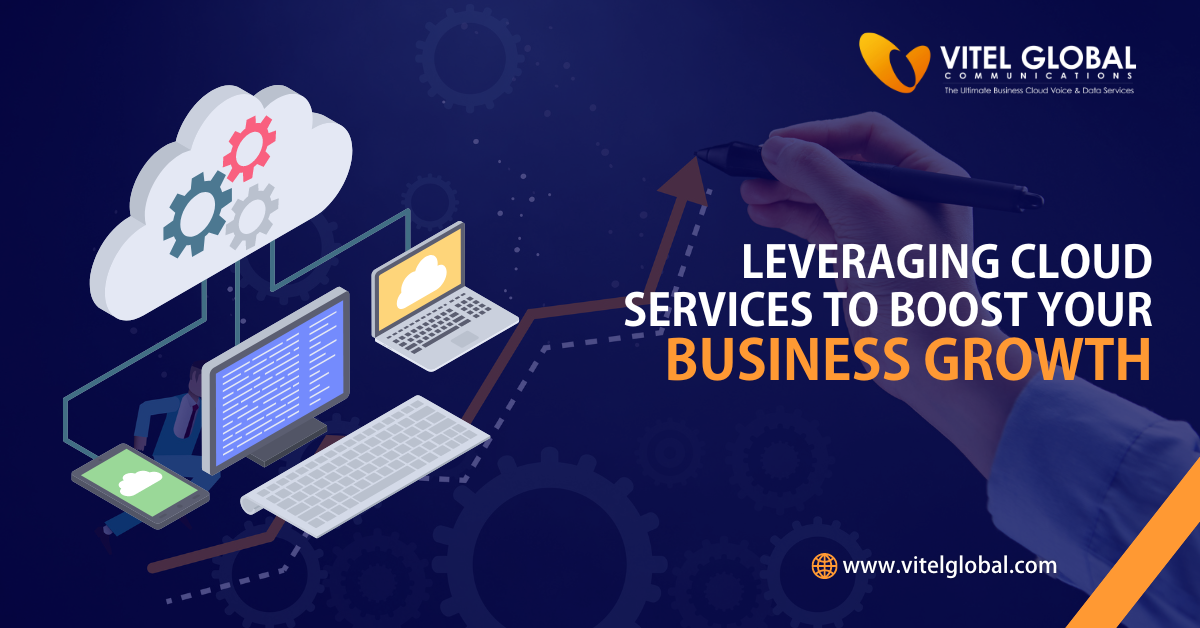Leveraging Cloud Services to Boost Your Business Growth

5 min read
Welcome to the world of cloud services, where businesses can leverage cutting-edge technologies and enjoy unparalleled scalability, agility, and cost savings. The cloud has revolutionized organizations’ operations by providing a flexible and secure environment for storing data, running applications, and collaborating globally.
In this blog post, we’ll explore how you can harness the power of a cloud phone system to boost your business growth – from reducing infrastructure costs to enhancing your productivity to reaching new markets faster than ever before.
Whether you’re a start-up or an established enterprise seeking innovation, this guide will help you unlock the full potential of cloud computing for your business success. So buckle up, and let’s dive into the exciting world of cloud-based solutions!
What is Cloud Computing?
Instead of a local server or a personal computer, cloud computing employs a network of remote servers hosted on the Internet to process, store, and manage data. Cloud computing allows businesses to access information and applications from any location with an Internet connection.
There are three main types: Infrastructure as a Service, Platform as a Service, and Software as a Service. IaaS provides businesses with access to storage, networking, and computing resources on demand. PaaS provides a platform for developers to create, test, and deploy applications in the cloud. SaaS provides businesses access to software applications hosted in the cloud.
Businesses can use the service to boost their growth in several ways. It can help businesses save money on infrastructure and IT costs. It can also help businesses improve their agility and responsiveness to market changes. Additionally, it helps businesses scale their operations quickly and efficiently.
Benefits of Using Cloud Services for Business Growth
There are many benefits of using it for business growth. Perhaps the most obvious benefit is the scalability that cloud computing offers. It can be scaled up or down as needed, which gives businesses the flexibility to respond quickly to changes in demand. Additionally, it can help businesses save money on infrastructure and IT costs. Because cloud providers manage all of the hardware and software associated with their services, businesses can avoid the expense of maintaining their own on-premises infrastructure.
IaaS, PaaS, and SaaS. IaaS provides customers access to a virtualized computing infrastructure, typically hosted in a data center. PaaS provides customers with access to a platform for developing and deploying applications. SaaS provides customers access to software applications typically hosted in the cloud.
IaaS is the most basic cloud phone system for business type, providing customers access to a virtualized computing infrastructure. It can include servers, storage, networking, and other infrastructure components. IaaS is often used by businesses that want to outsource their IT infrastructure or need more internal resources to manage it themselves.
PaaS is a cloud service that provides customers access to a platform for developing and deploying applications. It includes tools and services for application development, testing, deployment, and management. Often used by businesses that want to develop custom applications or need more control over their application development process than what is provided by SaaS.
SaaS is the most common service, providing customers access to software applications typically hosted in the cloud. Software as a Service application is usually accessed via a web browser or mobile app. Businesses often use SaaS because it offers a pay-as-you-go pricing model.
Another key benefit is that they can help businesses improve their agility and responsiveness. By moving to the cloud, businesses can use new technologies and capabilities faster than relying on on-premises infrastructure. This increased agility can give businesses a competitive edge in today’s rapidly changing marketplace.
It can provide businesses with greater security and reliability than they could achieve alone. When businesses outsource their IT needs to a reputable cloud provider, they can be confident that their data and applications will be well-protected. Additionally, by taking advantage of cloud providers’ economies of scale, businesses can access world-class security features and technologies at a fraction of the cost of building them from scratch.
How to Choose the Right Service
There is no one-size-fits-all solution. The best service for your business will depend on several factors, including your budget, your company’s size and needs, and the applications you use.
To help you choose the right one for your business, we’ve put together a few tips:
1. Define Your Objectives:
Before you start looking at different cloud services, you must take the time to define your objectives. Can you describe your goals for moving to the cloud? Once you know what you want to accomplish, you can narrow your options and find a solution that fits your needs.
2. Consider Your Budget:
Budget is also an important consideration before choosing any type of phone system. With it, you have the flexibility to pay only for the resources you use, which can save money in the long run. That said, it’s still important to consider your budget when choosing the provider and determine what pricing model will work best for your business.
3. Evaluate Your Current Infrastructure:
If you already have an IT infrastructure, evaluating how well it works is important before switching to a new cloud service provider. In some cases, it may be more cost-effective to keep using your existing infrastructure and supplement it.
Strategies to Increase Your ROI:
As a business owner, you always seek ways to increase your ROI. You may be considering it to boost your business growth.
Here are some strategies to help you:
- Define your goals. Before you start using it, take some time to think about what you want to achieve. What are your specific goals? What do you hope to accomplish by leveraging the power of the cloud? Once you know what you want to accomplish, you can select the right services and tools to help you reach your goals.
- Do your research. Not all systems are created equal. Spend some time researching different providers and offerings before making a decision. Find out what others are saying about their experiences with various providers. Look for providers that offer features and tools that align with your specific needs and goals.
- Start small. When starting with services, it’s often best to start small and gradually increase your usage over time. It will allow you to get a feel for how cloud services work and how they can benefit your business without making a major investment upfront. You can always scale up later once you’ve tried and see how they work.
- Make use of free trials. Many providers offer free trials of their products or services. It is a great way to test out a provider
Considerations Before Moving to the Cloud:
When moving your business to the cloud, there are a few key considerations to remember. Think before making the switch:
- What workloads do you plan to run in the cloud?
- How much control do you need over your data and applications?
- What is your budget for migrating to and operating in the cloud?
- What are your compliance requirements?
- How will you ensure the security and privacy of your data in the cloud?
- What level of support do you need from your cloud provider?
Security Measures When Leveraging
As your business grows, you will likely find that leveraging cloud services is an increasingly attractive option. Not only can they help reduce your operational costs, but they can also provide you with a more flexible and scalable infrastructure. However, before you take advantage of the many benefits of cloud computing, it’s important to understand the potential security risks involved.
You can take several steps to mitigate the risks associated with using cloud phone systems for business. First and foremost, you should only use reputable and well-established providers. Make sure to read reviews and do some research before selecting a provider. Once you’ve selected a provider, carefully review their security policies and procedures.
In addition to selecting a secure provider, you should secure your data and applications. Be sure to encrypt all sensitive data before storing it in the cloud. It would be best to consider implementing two-factor authentication for any user accounts accessing cloud-based resources. By taking these precautions, you can help ensure that your data remains safe and secure while taking advantage of the many benefits of cloud computing.
Conclusion:
Cloud-based business phones are a great way to boost your business’s growth. By leveraging the power of cloud-based applications, you can reduce IT costs and improve collaboration between teams. In addition, with more efficient data storage solutions, you can save money in the long run by streamlining processes like customer support and sales management. Ultimately, it is up to businesses to evaluate their specific needs and determine how best to utilize cloud-based business phones to maximize their potential for success.
Published: May 1st, 2023
Subscribe to Our Latest Updates
Get monthly product and feature updates, the latest industry news, and more!




